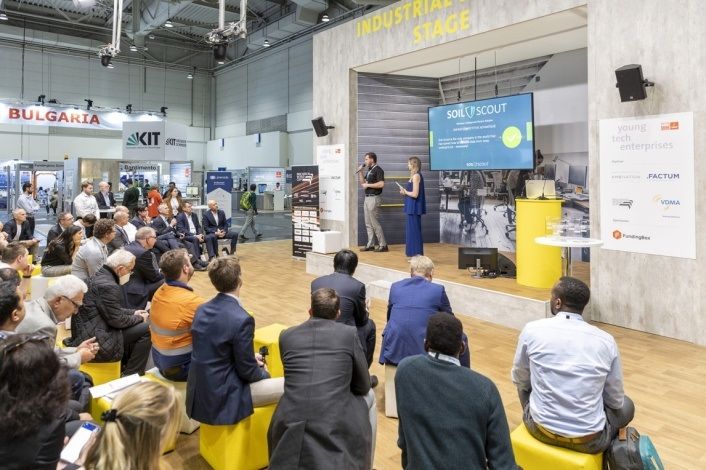Hannover Messe 2023 Features 300+ Startups
Startups are sources of innovation that develop new technologies and business models and help solve the challenges of our time. Their products and solutions – from blockchain and machine learning to digital twins and IT/OT integration to e-mobility and green hydrogen – reflect this.
The central Startup Area in Hall 17 consists of exhibition and stage areas for product presentations and one-on-one meetings as well as a range of different networking formats. “We offer a number of packages that meet the individual needs of participating startups,” explains Basilios Triantafillos, global director at Hannover Messe. “The supporting program, featuring stage and side events, adds to the range of networking opportunities.” Complementing this is the “Young & Innovative Companies” group exhibit in Hall 16, which is sponsored by the German Office of Economics and Export Control.
The company ai-omatic solutions GmbH exhibits at Hannover Messe for the first time this year. The Hamburg-based startup showcases a digital maintenance assistant that transfers an engineer’s expert knowledge to an AI system with limitless processing capacity, detecting unusual behavior before it becomes a problem. It represents the first working and scalable solution for monitoring machinery to provide reliable and interpretable results. “We look forward to Hannover Messe, because we know it will be well attended. We hope to meet potential customers, partners and investors and draw attention to our company’s solution,” reports Anna Weirauch, customer success manager at ai-omatic solutions. “Currently we are building promising partnerships with SAP, Siemens, LHIND, Adamos and Telekom. Our product is geared to production companies and machine manufacturers, for example in the automotive, packaging, pharmaceutical, food and chemical industries.”
“The Digital Hub Initiative (de:hub) and its 12 digital hubs unite startups and SMEs via industry-specific programs where they work together on digital solutions,” explains Karolin Hewelt, hub agency lead of the Digital Hub Initiative and co-founder of RCKT. "Hannover Messe brings together potential cooperation partners and enables them to exchange innovative ideas,” she continues. “Our matchmaking format facilitates targeted networking, provides impulses for collaboration and thus lays the foundation for innovative partnerships between startups and SMEs."
“The 20 companies selected are among the most promising and innovative of our portfolio. The technologies they will present at the EIC Pavilion range from digitalization, artificial intelligence and automation to sustainable energy concepts for societal challenges. These EIC pioneers are looking for new business partners to enter new markets and scale up their activities," said Stephane Ouaki, head of the European Innovation Council and SMEs Executive Agency.
The Netherlands participates in the Startup Area for the sixth time with the Netherlands Innovation Square. “Hannover Messe has proven to be a great global platform for startups, as it is an ever-growing force driving technical innovation and helping to solve the major societal challenges and opportunities of the energy transition and digitalization,” said Willem Drost, co-organizer of Netherlands Innovation Square. “Trends to shorten global supply routes are also offering great new opportunities for startups at the fair, as many companies are searching for new suppliers and development partners nearby that offer innovative and pioneering technologies,” he added.




